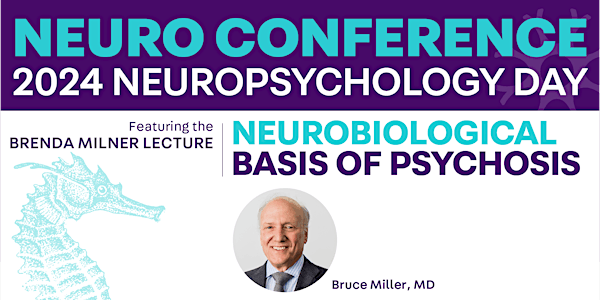
25th Annual Brenda Milner Neuropsychology Day and Lecture
Neuropsychology Day honours the career and achievements of Dr. Milner, an eminent cognitive neuroscientist and pioneer of neuropsychology.
Date and time
Location
Montreal Neurological Institute – Hospital
3801 Rue University Montréal, QC H3A 2B4 CanadaAbout this event
- 5 hours 30 minutes
The 25th Annual Neuropsychology Day and Brenda Milner Lecture honours the career and achievements of Dr. Milner, an eminent cognitive neuroscientist and pioneer of the discipline of neuropsychology. We are pleased to welcome Dr. Bruce Miller as the 25th Annual Brenda Milner Lecturer in Cognitive Neuroscience. His talk, titled Neurobiological Basis of Psychosis, starts at 4:00 p.m.
Keynote Speaker: Dr. Bruce Miller
A.W. and Mary Margaret Clausen Distinguished Professor in Neurology; Director,
Memory and Aging Center; Founding Director, Global Brain Health Institute, UCSF
Speaker Bio: Dr. Miller holds the A.W. and Mary Margaret Clausen Distinguished Professorship in Neurology at UC San Francisco where he directs the Memory and Aging Center, an NIH sponsored Alzheimer’s Disease Research Center. As a behavioral neurologist whose work emphasizes brain-behavior relationships, he has reported on the emergence of artistic ability, personality, cognition, and emotion with the onset of neurodegenerative disease.
Talk Abstract: 15–100/100,000 people develop psychosis each year, at a cost of $280 to $340 billion per year. The scientific community has made little progress in understanding and treating schizophrenia over the years. Genes and environment interact to determine symptoms that typically include delusions, hallucinations, thought disorders, blunted affect, and inappropriate behavior. The causes of schizophrenia include genetic risks, differences in brain development, in utero viral infections, and other developmental stressors or trauma. Autoimmune diseases, metabolic conditions, and neurological disorders can also play a role in psychosis. It is important to understand the different subtypes of psychosis and their corresponding anatomical and neurochemical differences, as this will impact treatment. Specific brain regions, such as the frontal and temporal lobes, basal ganglia, and thalamus, are involved in different forms of psychosis. Frontal and anterior temporal lobe dysfunction underlies false beliefs, hallucinations, and delusions in psychosis. Studying the biology of beliefs could provide insights into the development and treatment of primary psychiatric disorders. Overall, there is a critical need for early screening, prevention, and targeted therapies for psychosis. A comprehensive approach that combines neurology, psychiatry, and genetics as well as community engagement will advance our understanding and treatment of psychosis.
Key Points:
1. Psychosis is a prevalent and costly health problem, with a lifetime incidence of 3% and an estimated cost of $280 to $340 billion per year in the United States.
2. The causes of schizophrenia include genetic risks, differences in brain development, in utero viral infections, and other developmental stressors or trauma.
3. Psychosis can be part of brain disorders of late life, such as Parkinson's disease, Alzheimer's disease, and frontotemporal dementia.
4. Different types of psychosis are associated with different anatomical and neurochemical abnormalities in the brain, such as atrophy in the dorsolateral prefrontal cortex, cingulate cortex, and medial and superior temporal lobe.
Learning Objectives:
1. Understand the complex nature of psychosis and its association with various neurological and psychiatric disorders.
2. Recognize the importance of genetic factors and brain anatomy in the development of psychosis.
3. Consider the potential for early screening and intervention in individuals at risk for psychosis.
Call for abstracts 2024 - Sharing Science and Knowledge
In honour of Brenda Milner’s foundational work in cognitive neuroscience, young scientists across Montreal will have the opportunity to share their ideas and advancements to the field. Trainees at the undergraduate, graduate, and postdoctoral level are invited to present their work as posters. Abstracts will also be considered for an oral presentation.
Abstract submissions will be entered into a competition with prizes of $250 for first place and $100 for three runners-up!
The scientific presentations are intended to ignite discussion, collaboration, and connection among the Montreal cognitive neuroscience community. We encourage you to share your most current project in any stage of development, including literature reviews, research questions, and pilot projects. Please submit your abstract of less than 150 words HERE .
Abstracts should be one page only and contain: 1) name of author & affiliation, 2) name of co-authors & affiliation, 3) title of abstract, 4) abstract. The deadline for submission is March 18, 2024.